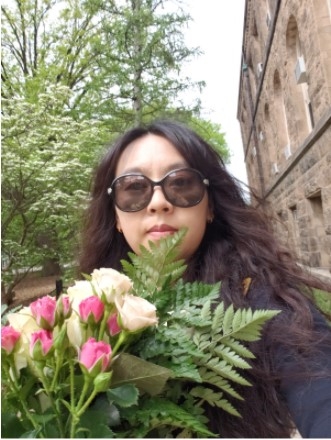

The James Joo-Jin Kim Program in Korean Studies at the University of Pennsylvania is pleased to introduce two incoming Moon Family Postdoctoral Fellows for the 2021–2022 academic year: Yoonjung Kang (left) and Ji Hye Kim (right).
Yoonjung Kang received her PhD in Anthropology from the University of Illinois at Urbana-Champaign. Her doctoral dissertation, A Plurality of Care: The Politics of Postpartum Care Practices in Contemporary South Korea, examines South Korean mothers’ postpartum care practices which have been dramatically reframed through the recent emergence of the postpartum care market, that is the postpartum care facility (sanhujoriwǒn) and the postpartum home-care help (sanhudoumi). Unraveling how Korean traditional postpartum beliefs and behaviors are rearticulated as invaluable care modalities in the increasingly marketized childbirth culture, the ethnography discusses the (re)making of norms and ideologies of the female reproductive body, gender, class, family/kinship, and the state in the neoliberal context of South Korea. Her research interests include childbirth/reproduction, women’s health, care, biomedicine, ethnomedicine, public health, and the global medical and healthcare market. She received her B.A. and M.A. in Sociology from Yonsei University (Seoul, South Korea). She was also the recipient of the Korea Foundation Graduate Studies Fellowship (2010-12).
Ji Hye Kim has studied cultural, cognitive sociology and social psychology in the Department of Sociology and Criminology at the University of Iowa. Her works specifically focus on the values and beliefs of South Koreans from a cross-cultural perspective. In her doctoral dissertation, “The Structure of Culture: Cross-Cultural Investigation of Shared Beliefs”, she takes an interdisciplinary approach to examining social cognition connected to social stratification and culture. To identify how individuals perceive the world differently based on their values and life goals, she utilizes latent classification methods to analyze primary and secondary data (survey and survey experiment) from both South Korea and the US. The findings show heterogeneous cultural logics among Koreans and also define the similarities and differences in the logics between Koreans and Americans. This dissertation further underscores how different cognitive patterns of beliefs are associated with educational, political, and religious outcomes, varying across stratification in the two societies. To expand the scope of cross-cultural investigations, one of her recent papers, published in Social Indicators Research (2021), examines how subjective social class is socially constructed in the comparison of Korea and other East Asian societies. Before joining the current program, Ji Hye received her BA in Sociology from Korea University (Seoul, South Korea), MPhil in Sociology from the Chinese University of Hong Kong (Hong Kong), and MA in Sociology from the University of Iowa.
 James Joo-Jin Kim Center for Korean Studies
James Joo-Jin Kim Center for Korean Studies